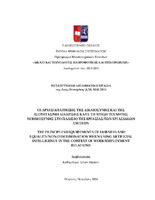Οι αρχές/απαιτήσεις της δικαιοσύνης και της ισότητας/μη διάκρισης κατά τη χρήση τεχνητής νοημοσύνης στο πλαίσιο της εργασίας/των εργασιακών σχέσεων
The principles/requirements of fairness and equality/non-discrimination when using artificial intelligence in the context of work/employment relations

Προβολή/
Λέξεις κλειδιά
Τεχνητή νοημοσύνη ; AI ; Αρχή της δικαιοσύνης ; Εργασιακές σχέσεις ; Artificial intelligenceΠερίληψη
Σήμερα διανύουμε την 4η βιομηχανική επανάσταση, η οποία περιλαμβάνει καινοτόμες και ανατρεπτικές τεχνολογίες. Στο επίκεντρο του ενδιαφέροντος βρίσκεται το τελευταίο διάστημα η τεχνητή νοημοσύνη, μια τεχνολογία η οποία είναι ικανή να αναπαράγει τις γνωστικές λειτουργίες του ανθρώπου. Η τεχνητή νοημοσύνη βρίσκει εφαρμογή και στον ευαίσθητο τομέα της εργασίας, ώστε γίνεται λόγος για αλγοριθμική διοίκηση των εργασιακών σχέσεων. Οι αλγοριθμικές αποφάσεις και συστάσεις παρουσιάζουν πολλαπλά οφέλη, όμως εγείρουν και αρκετος ηθικούς προβληματισμούς οι οποιοι έχουν να κάνουν μεταξύ άλλων με την αλγοριθμική μεροληψία. Οι αλγόριθμοι που ενσωματώνουν υποσυνείδητες προκαταλήψεις ή βασίζονται σε δεδομένα μεροληπτικά, τείνουν να ευνοούν ορισμένες κοινωνικές ομάδες σε βάρος άλλων, επιτείνοντας έτσι τις ήδη υπάρχουσες αδικίες και ανισότητες στην κοινωνία. Η εξασφάλιση της δικαιοσύνης στους αλγορίθμους αποτελεί ηθική αλλά και νομική υποχρέωση.
Στην παρούσα μελέτη, θα εξετάσουμε την έννοια της τεχνητής νοημοσύνης, τα είδη στα οποία διακρίνεται και τον τρόπο λειτουργίας της. Θα εστιάσουμε ιδιαίτερα στο πρόβλημα της αλγοριθμικής μεροληψίας, αναλύοντας τις αιτίες που οδηγούν σε αυτό, αναφέροντας και την ειδικότερη περίπτωση του φαινομένου της έμμεσης αλγοριθμικής μεροληψίας. Στη συνέχεια, θα μελετήσουμε την έννοια της δικαιοσύνης στα συστήματα τεχνητής νοημοσύνης, όχι μόνο ως νομική απαίτηση αλλά και ως ηθική αρχή και τεχνικό πρότυπο. Μέσα από πρακτικά παραδείγματα, θα παρουσιάσουμε περιπτώσεις όπου η χρήση της τεχνητής νοημοσύνης στις εργασιακές σχέσεις οδήγησε σε φαινόμενα αλγοριθμικής μεροληψίας, αναλύοντας και μια μελέτη περίπτωσης που αναδεικνύει τις προκλήσεις για την επίτευξη δίκαιων αλγοριθμικών αποφάσεων. Επιπλέον, θα εξετάσουμε το υφιστάμενο νομοθετικό πλαίσιο που αποσκοπεί στην προστασία των εργαζομένων από άδικες αλγοριθμικές αποφάσεις. Αυτό περιλαμβάνει τον Γενικό Κανονισμό Προστασίας Δεδομένων, τη νομοθεσία της Ευρωπαϊκής Ένωσης και της Ελλάδας κατά των διακρίσεων, τον Κανονισμό για την τεχνητή νοημοσύνη, την Οδηγία για τους εργαζόμενους σε πλατφόρμες και τον νόμο 4961/2022. Θα αναλύσουμε πώς αυτό το πλαίσιο επιδιώκει να εξασφαλίσει τη δικαιοσύνη στις αλγοριθμικές αποφάσεις, τόσο με προληπτικά όσο και με κατασταλτικά μέσα. Τέλος, θα παρουσιάσουμε συμπεράσματα και προβληματισμούς που προέκυψαν από τη μελέτη αυτών των θεμάτων.


